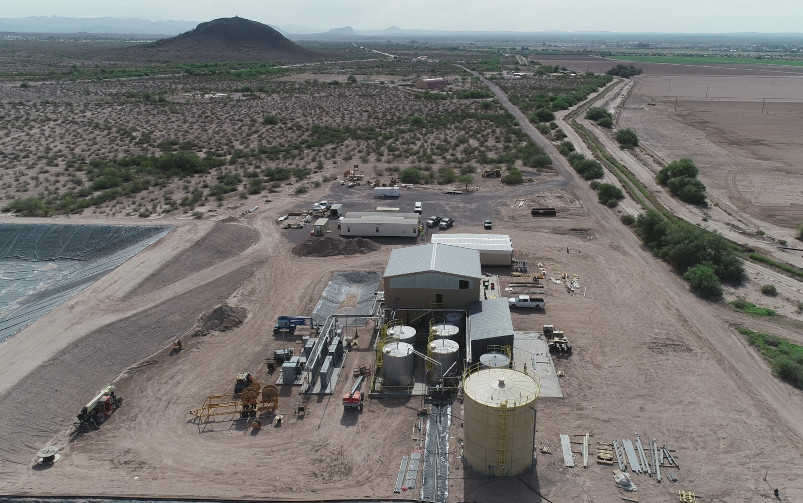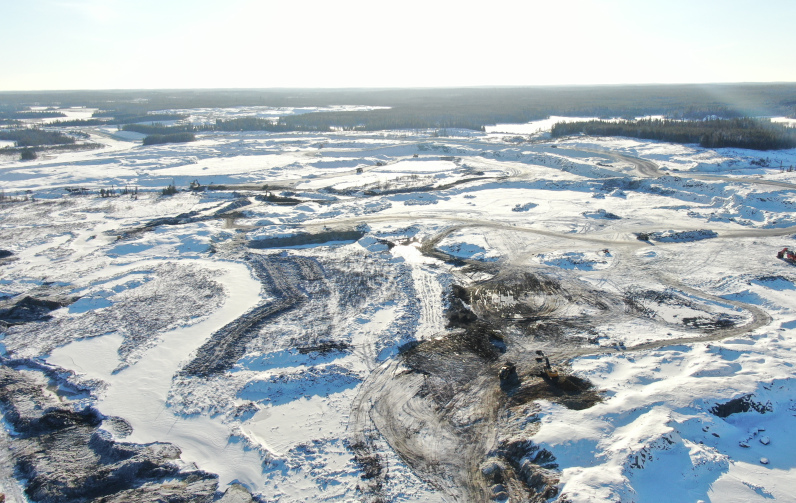A rendering of the two ElectRA 2300 SX electric tugboats that will go into operation at Vancouver's Neptune Terminal in 2023, thanks to Teck Resources and SAAM Towage. Courtesy of Teck Resources.
Welcome back to your weekly mining news recap, where we catch you up on some of the news you may have missed. This week’s headlines include Namibian graphite production, a new mine electrification consortium and the start of deep sea mining.
Following the completion of construction in 2024, Greenstone Gold Mines, located in northwestern Ontario, is set to be one of Canada’s largest gold mines to date. The project, a 60-40 partnership between Equinox Gold and Orion Mine Finance Group, faced numerous challenges to begin construction, including dealing with homes and infrastructure located on the project’s footprint. The US$1.225 billion project commenced construction a year ago and is expected to produce roughly 366,000 ounces of gold per year over its 14-year life.
In an interview with CIM Magazine, Suncor’s chief climate officer Martha Hall Findlay discusses how Suncor is addressing greenhouse gas emissions, noting that some of the company’s shareholders are now showing interest in investing in “high emitters who are working to reduce their emissions.” Hall Findlay is a key figure involved in developing the Pathways to Net Zero plan, an alliance that is comprised of six companies that represent 95 per cent of the oil sands production. Hall Findlay explained that the vision for Pathways is one that includes all companies and various technologies, with a CCUS (carbon capture, utilization and storage) project that is expected to be the largest one to date.
Vital Metals, an Australian mining company, opted out of two Quebec-based projects this week due to objections to them from a local First Nation, as reported by The Financial Post. Vital Metals had initially signed an $8-million agreement with Montreal-based company Quebec Precious Metals Corp. last year, with a plan to acquire 68 and 100 per cent interests in the Kipawa and Zeus rare earth metals projects located in the province’s Témiscamingue region. Among the Kebaowek First Nation concerns was that the mining sites were located along a watershed that supplies drinking water to the community.
Rio Tinto is partnering with the Canadian government to invest up to $737 million over the next eight years towards the decarbonization of its Rio Tinto Fer et Titane operations located in Sorel-Tracy, Quebec. This collaboration is expected to invest in innovations aimed at reducing greenhouse gas emissions from the company’s titanium dioxide, steel and metal powders business by up to 70 per cent. Canada will be investing up to $222 million through its Strategic Innovation Fund.
General Motors announced that it would be investing up to US$69 million and take an equity stake in Queensland Pacific Metals in order to acquire a new source of nickel and cobalt, as reported by Reuters. The metals produced will be utilized to produce battery cells for use in the U.S. automaker’s vehicles. General Motors explained that “the investment will help support electric-vehicle eligibility for consumer incentives under new, clean energy U.S. tax credits.”
Gratomic Inc. has begun bench mining at the Aukam graphite mine in Namibia. Roughly 1,000 tonnes of graphite have been transported from the mine and are pending processing, with another 1,600 tonnes extracted. The mine was left dormant for nearly 40 years, until new exploration efforts found a resource remaining in the mine, which was acquired in full by Gratomic in 2017.
Shell has launched a consortium aimed at aiding miners by accelerating the adoption of electric trucks while safely reducing emissions, as reported by the Canadian Mining Journal. An interoperable electrification system is currently being piloted by Shell, along with eight additional companies, with the intent of introducing 220 new off-road vehicles. The vehicles will undergo testing at a Shell facility in Germany next year, with final field trials at certain mining sites expected to follow in 2024.
On Oct. 13, Vale Canada Limited opened the first phase of its Copper Cliff Complex South Mine Project that is located in Sudbury, as reported by the Sudbury Star. The project is valued at $945 million and employs 270 workers. Phase 1 of production is expected to add nearly 10,000 tonnes of nickel and 13,000 tonnes of copper to the Complex’s annual production.
The Metals Company announced the completion of its first collection run of polymetallic nodules found below the surface of the Pacific Ocean, as reported by Mining.com. The Vancouver-based company explained that its production vessel collected an initial batch of seafloor nodules that were later transported to the surface through a 4.3-kilometre-long riser system. This operation is the first integrated system test that has occurred in the Clarion Clipperton zone of the Pacific since the 1970s.
Teck Resources and SAAM Towage have partnered to provide two electric tugboats to Vancouver’s Neptune Terminal, an effort in support of Teck’s climate goals. This will mark the first electric tugboats operating in Canada as a full tugboat package aimed at harbour assistance and tug services. Two ElectRA 2300 SX tugboats will be furnished by SAAM and are expected to go into operation in the second half of 2023.
That’s all for this week. If you’ve got feedback, you can always reach us at editor@cim.org. If you’ve got something to add, why not join the conversation on our Facebook, Twitter, LinkedIn or Instagram pages?




